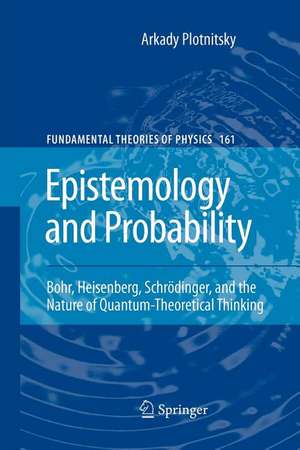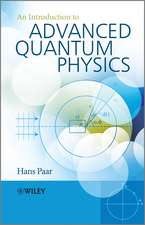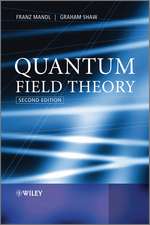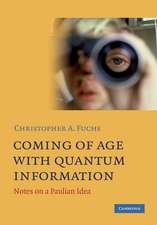Epistemology and Probability: Bohr, Heisenberg, Schrödinger, and the Nature of Quantum-Theoretical Thinking: Fundamental Theories of Physics, cartea 161
Autor Arkady Plotnitskyen Limba Engleză Paperback – 25 feb 2012
| Toate formatele și edițiile | Preț | Express |
|---|---|---|
| Paperback (1) | 1223.43 lei 43-57 zile | |
| Springer – 25 feb 2012 | 1223.43 lei 43-57 zile | |
| Hardback (1) | 1231.78 lei 43-57 zile | |
| Springer – 5 noi 2009 | 1231.78 lei 43-57 zile |
Din seria Fundamental Theories of Physics
-
 Preț: 495.16 lei
Preț: 495.16 lei - 20%
 Preț: 1002.37 lei
Preț: 1002.37 lei -
 Preț: 426.56 lei
Preț: 426.56 lei - 20%
 Preț: 819.48 lei
Preț: 819.48 lei - 18%
 Preț: 779.26 lei
Preț: 779.26 lei - 18%
 Preț: 955.25 lei
Preț: 955.25 lei - 18%
 Preț: 950.52 lei
Preț: 950.52 lei - 24%
 Preț: 794.89 lei
Preț: 794.89 lei - 15%
 Preț: 589.80 lei
Preț: 589.80 lei - 18%
 Preț: 948.47 lei
Preț: 948.47 lei - 18%
 Preț: 1229.73 lei
Preț: 1229.73 lei - 15%
 Preț: 587.83 lei
Preț: 587.83 lei - 18%
 Preț: 1236.06 lei
Preț: 1236.06 lei - 18%
 Preț: 946.87 lei
Preț: 946.87 lei -
 Preț: 394.87 lei
Preț: 394.87 lei - 18%
 Preț: 954.93 lei
Preț: 954.93 lei - 18%
 Preț: 1241.10 lei
Preț: 1241.10 lei - 18%
 Preț: 954.93 lei
Preț: 954.93 lei - 18%
 Preț: 953.35 lei
Preț: 953.35 lei - 18%
 Preț: 948.92 lei
Preț: 948.92 lei - 15%
 Preț: 648.05 lei
Preț: 648.05 lei - 18%
 Preț: 1232.09 lei
Preț: 1232.09 lei - 18%
 Preț: 996.78 lei
Preț: 996.78 lei - 18%
 Preț: 946.41 lei
Preț: 946.41 lei - 15%
 Preț: 640.24 lei
Preț: 640.24 lei - 15%
 Preț: 636.80 lei
Preț: 636.80 lei -
 Preț: 391.79 lei
Preț: 391.79 lei - 18%
 Preț: 780.19 lei
Preț: 780.19 lei -
 Preț: 391.79 lei
Preț: 391.79 lei - 15%
 Preț: 649.06 lei
Preț: 649.06 lei -
 Preț: 397.76 lei
Preț: 397.76 lei - 24%
 Preț: 586.69 lei
Preț: 586.69 lei - 15%
 Preț: 644.95 lei
Preț: 644.95 lei - 18%
 Preț: 1228.15 lei
Preț: 1228.15 lei
Preț: 1223.43 lei
Preț vechi: 1491.99 lei
-18% Nou
Puncte Express: 1835
Preț estimativ în valută:
234.16€ • 241.32$ • 197.69£
234.16€ • 241.32$ • 197.69£
Carte tipărită la comandă
Livrare economică 03-17 martie
Preluare comenzi: 021 569.72.76
Specificații
ISBN-13: 9781461424833
ISBN-10: 1461424836
Pagini: 436
Ilustrații: XXXIV, 402 p. 2 illus.
Dimensiuni: 155 x 235 x 23 mm
Greutate: 0.61 kg
Ediția:2010
Editura: Springer
Colecția Springer
Seria Fundamental Theories of Physics
Locul publicării:New York, NY, United States
ISBN-10: 1461424836
Pagini: 436
Ilustrații: XXXIV, 402 p. 2 illus.
Dimensiuni: 155 x 235 x 23 mm
Greutate: 0.61 kg
Ediția:2010
Editura: Springer
Colecția Springer
Seria Fundamental Theories of Physics
Locul publicării:New York, NY, United States
Public țintă
ResearchCuprins
Introduction—Epistemology and Probability in Quantum Theory: Physics, Mathematics, and Philosophy.- Quantum Phenomena and the Double-Slit Experiment.- Heisenberg’s Revolutions: New Kinematics, New Mathematics, and New Philosophy.- From Geometry to Algebra in Physics, with Heisenberg.- Schrödinger’s Waves: Propagation and Probability.- Bohr’s Como Argument: Complementarity and the Problem of Causality.- From Como to Copenhagen: Renunciations.- Can Quantum-Mechanical Description of Physical Reality Be Considered both Complete and Local?.- Essential Ambiguity and Essential Influence: Reading Bohr’s Reply to EPR.- Mysteries Without Mysticism, Correlations Without Correlata, Epistemology Without Ontology, and Probability Without Causality.- 11 Conclusion: “The Mere Touch of Cold Philosophy”.
Recenzii
From the reviews:
“Plotnitsky (theory and cultural studies, Purdue Univ.) analyzes the discussions and disagreements among the principals (mentioned in the title), and offers his insightful comments on the questions. … The discussions on probability and epistemology remind readers of 18th-century debates on the topic in which d’Alembert participated. This book should interest anyone seeking a deeper understanding of the epistemology of quantum mechanics, especially the issues thrashed out in the early phases. … Summing Up: Highly recommended. Academic libraries serving graduate students, researchers, and faculty.” (V. V. Raman, Choice, Vol. 47 (10), June, 2010)
“This is an exposition of what the author calls ‘non-classical epistemology’ in close relationship with the emergence and development of quantum mechanics. … Plotnitsky unfolds a nuanced presentation of the so-called ‘Copenhagen spirit’ or, more precisely, of the ideas of his central hero, Niels Bohr, taken to their logical conclusion. … Plotnitsky’s narrative makes fascinating reading, and not only for those who are sympathetic to his views. … the book represents a challenge and motivation for the opponents of such views, particularly scientific realists.” (Vassilis Sakellariou, Metascience, Vol. 21, 2012)
“Plotnitsky (theory and cultural studies, Purdue Univ.) analyzes the discussions and disagreements among the principals (mentioned in the title), and offers his insightful comments on the questions. … The discussions on probability and epistemology remind readers of 18th-century debates on the topic in which d’Alembert participated. This book should interest anyone seeking a deeper understanding of the epistemology of quantum mechanics, especially the issues thrashed out in the early phases. … Summing Up: Highly recommended. Academic libraries serving graduate students, researchers, and faculty.” (V. V. Raman, Choice, Vol. 47 (10), June, 2010)
“This is an exposition of what the author calls ‘non-classical epistemology’ in close relationship with the emergence and development of quantum mechanics. … Plotnitsky unfolds a nuanced presentation of the so-called ‘Copenhagen spirit’ or, more precisely, of the ideas of his central hero, Niels Bohr, taken to their logical conclusion. … Plotnitsky’s narrative makes fascinating reading, and not only for those who are sympathetic to his views. … the book represents a challenge and motivation for the opponents of such views, particularly scientific realists.” (Vassilis Sakellariou, Metascience, Vol. 21, 2012)
Textul de pe ultima copertă
Quantum mechanics, discovered by Werner Heisenberg and Erwin Schrödinger in 1925-1926, is famous for its radical implications for our conception of physics and for our view of human knowledge in general. While these implications have been seen as scientifically productive and intellectually liberating to some, Niels Bohr and Heisenberg, among them, they have been troublesome to many others, including Schrödinger and, most famously, Albert Einstein. The situation led to the intense debate that started in the wake of its discovery and has continued into our own time, with no end appearing to be in sight.
Epistemology and Probability aims to contribute to our understanding of quantum mechanics and of the reasons for its extraordinary impact by reconsidering, under the rubric of "nonclassical epistemology," the nature of epistemology and probability, and their relationships in quantum theory. The book brings together the thought of the three figures most responsible for the rise of quantum mechanics—Heisenberg and Schrödinger, on the physical side, and Bohr, on the philosophical side—in order to develop a deeper sense of the physical, mathematical, and philosophical workings of quantum-theoretical thinking. Reciprocally, giving a special emphasis on probability and specifically to the Bayesian concept of probability allows the book to gain new insights into the thought of these figures. The book reconsiders, from this perspective, the Bohr-Einstein debate on the epistemology of quantum physics and, in particular, offers a new treatment of the famous experiment of Einstein, Podolsky, and Rosen (EPR), and of the Bohr-Einstein exchange concerning the subject. It also addresses the relevant aspects of quantum information theory and considers the implications of its epistemological argument for higher-level quantum theories, such as quantum field theory and string and brane theories. One of the main contributions of the book is its analysis of the role ofmathematics in quantum theory and in the thinking of Bohr, Heisenberg, and Schrödinger, in particular an examination of the new (vis-à-vis classical physics and relativity) type of the relationships between mathematics and physics introduced by Heisenberg in the course of his discovery of quantum mechanics.
Although Epistemology and Probability is aimed at physicists, philosophers and historians of science, and graduate and advanced undergraduate students in these fields, it is also written with a broader audience in mind and is accessible to readers unfamiliar with the higher-level mathematics used in quantum theory.
Epistemology and Probability aims to contribute to our understanding of quantum mechanics and of the reasons for its extraordinary impact by reconsidering, under the rubric of "nonclassical epistemology," the nature of epistemology and probability, and their relationships in quantum theory. The book brings together the thought of the three figures most responsible for the rise of quantum mechanics—Heisenberg and Schrödinger, on the physical side, and Bohr, on the philosophical side—in order to develop a deeper sense of the physical, mathematical, and philosophical workings of quantum-theoretical thinking. Reciprocally, giving a special emphasis on probability and specifically to the Bayesian concept of probability allows the book to gain new insights into the thought of these figures. The book reconsiders, from this perspective, the Bohr-Einstein debate on the epistemology of quantum physics and, in particular, offers a new treatment of the famous experiment of Einstein, Podolsky, and Rosen (EPR), and of the Bohr-Einstein exchange concerning the subject. It also addresses the relevant aspects of quantum information theory and considers the implications of its epistemological argument for higher-level quantum theories, such as quantum field theory and string and brane theories. One of the main contributions of the book is its analysis of the role ofmathematics in quantum theory and in the thinking of Bohr, Heisenberg, and Schrödinger, in particular an examination of the new (vis-à-vis classical physics and relativity) type of the relationships between mathematics and physics introduced by Heisenberg in the course of his discovery of quantum mechanics.
Although Epistemology and Probability is aimed at physicists, philosophers and historians of science, and graduate and advanced undergraduate students in these fields, it is also written with a broader audience in mind and is accessible to readers unfamiliar with the higher-level mathematics used in quantum theory.
Caracteristici
Offers a joint and mutually illuminating discussion of Bohr, Heisenberg, and Schrödinger, as creators of quantum mechanics (including an interpretation as complementarity), which is unprecedented - at least at this level of comprehensiveness Offers an exploration of the relationships between epistemology and probability and their relationships, especially in the Bayesian context Gives a new treatment of the EPR experiment, and the Bohr-Einstein exchange concerning it Offers a new understanding of the role of mathematics in quantum theory Includes supplementary material: sn.pub/extras












